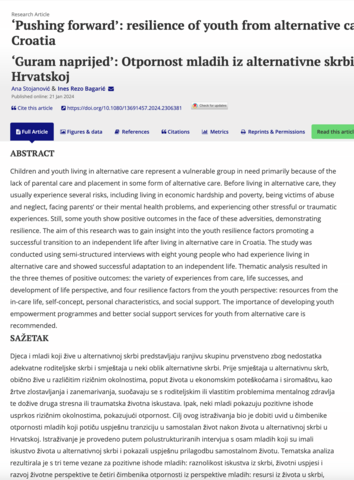Abstract:
Children and youth living in alternative care represent a vulnerable group in need primarily because of the lack of parental care and placement in some form of alternative care. Before living in alternative care, they usually experience several risks, including living in economic hardship and poverty, being victims of abuse and neglect, facing parents’ or their mental health problems, and experiencing other stressful or traumatic experiences. Still, some youth show positive outcomes in the face of these adversities, demonstrating resilience.
The aim of this research was to gain insight into the youth resilience factors promoting a successful transition to an independent life after living in alternative care in Croatia. The study was conducted using semi-structured interviews with eight young people who had experience living in alternative care and showed successful adaptation to an independent life.
Thematic analysis resulted in the three themes of positive outcomes: the variety of experiences from care, life successes, and development of life perspective, and four resilience factors from the youth perspective: resources from the in-care life, self-concept, personal characteristics, and social support. The importance of developing youth empowerment programmes and better social support services for youth from alternative care is recommended.
Sažetak
Djeca i mladi koji žive u alternativnoj skrbi predstavljaju ranjivu skupinu prvenstveno zbog nedostatka adekvatne roditeljske skrbi i smještaja u neki oblik alternativne skrbi. Prije smještaja u alternativnu skrb, obično žive u različitim rizičnim okolnostima, poput života u ekonomskim poteškoćama i siromaštvu, kao žrtve zlostavljanja i zanemarivanja, suočavaju se s roditeljskim ili vlastitim problemima mentalnog zdravlja te dožive druga stresna ili traumatska životna iskustava. Ipak, neki mladi pokazuju pozitivne ishode usprkos rizičnim okolnostima, pokazujući otpornost. Cilj ovog istraživanja bio je dobiti uvid u čimbenike otpornosti mladih koji potiču uspješnu tranziciju u samostalan život nakon života u alternativnoj skrbi u Hrvatskoj. Istraživanje je provedeno putem polustrukturiranih intervjua s osam mladih koji su imali iskustvo života u alternativnoj skrbi i pokazali uspješnu prilagodbu samostalnom životu. Tematska analiza rezultirala je s tri teme vezane za pozitivne ishode mladih: raznolikost iskustva iz skrbi, životni uspjesi i razvoj životne perspektive te četiri čimbenika otpornosti iz perspektive mladih: resursi iz života u skrbi, samopoimanje, osobne karakteristike i socijalna podrška. U radu se navode smjernice za razvoj programa osnaživanja mladih i boljih usluga socijalne podrške za mlade iz alternativne skrbi.

